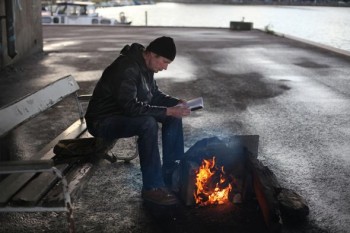Search results for "2010/10/mikko-rimminen-nenapaiva-nose-day"
Egg in a Cage?
17 August 2012 | This 'n' that

Noises off: the Chapel of Silence. Photo: Mika Huisman/Decopic
A windowless wooden construction with a timber interior sits on a busy route between the bus and railway stations in the middle of Helsinki. The egg-shaped Chapel of Silence contains simple wooden benches, offering a moment of peace and quiet for anyone passing by.
Almost 12 metres high, 270 square metres in overall footprint, it is a sacral space, with a small cross and an altar at the back, but it is not intended for liturgical purposes – however, social services are available for private conversation during opening hours.
Helsinki is this year’s World Design Capital – together with the neighbouring cities of Espoo, Vantaa, and Kauniainen, and Lahti, a hundred kilometres to the north. Every second year the International Council of Societies of Industrial Design recognises one global city `for its accomplishments in utilizing design as a tool to improve social, cultural, and economic life’. More…
Tutti frutti
20 November 2009 | In the news
 The chair of the jury for the Finlandia Prize for Non-Fiction 2009, Professor Pekka Puska, compared choosing a winner to the dilemma of choosing between oranges and bananas. The jury found that among the entries were at least 20 or 30 books that could have gone on the final shortlist of six titles. More…
The chair of the jury for the Finlandia Prize for Non-Fiction 2009, Professor Pekka Puska, compared choosing a winner to the dilemma of choosing between oranges and bananas. The jury found that among the entries were at least 20 or 30 books that could have gone on the final shortlist of six titles. More…
Anu-Hanna Anttila & al.: Kuriton kansa [Unruly nation]
13 August 2010 | Mini reviews, Reviews
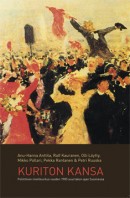 Anu-Hanna Anttila & Ralf Kauranen & Olli Löytty & Pollari Mikko Rantanen Pekka & Petri Ruuska
Anu-Hanna Anttila & Ralf Kauranen & Olli Löytty & Pollari Mikko Rantanen Pekka & Petri Ruuska
Kuriton kansa. Poliittinen mielikuvitus vuoden 1905 suurlakon ajan Suomessa
[Unruly nation. The political imagination of the 1905 general strike in Finland]
Tampere: Vastapaino, 2009. 317 p., ill.
ISBN 978-951-768-246-6
€ 33, paperback
In the beginning of the 20th century the Grand Duchy of Finland, a part of the Russian Empire, entered a period of crisis and began to turn into a nation with its own institutions. Universal and equal suffrage increased tenfold the number of those eligible to vote. A move to the granting of political rights was demanded during the 1905 general strike, which was both an internal political power struggle and a demonstration by Finns against the Russification measures being imposed by their rulers. The book examines the ideological currents of the strike period and investigates their definitions of ‘nation’ and ‘nationality’, with reference to literary research, historical sociology, cultural studies and women’s studies, making extensive use of contemporary documents. The book’s essays portray the spectrum of ideas, reflected in groups like the theosophists, Tolstoyans and anarchists.
Slowly does it
5 November 2009 | Reviews

Straight from the oven: cabbage rolls. – Photo: Sami Repo
Mummola
[Grandma’s house]
(food: Hans Välimäki, photographs: Sami Repo, text: Mikko Takala, graphic design: Timo Numminen)
Helsinki: Otava, 2009. 224 p., ill.
ISBN 978-951-1-23930-7
€ 40
How paradoxical: in the past couple of decades, numerous internationally famous gourmet restaurants have sprung up in Finland, and at the same time it’s harder than ever to find ordinary, well-prepared ingredients for cooking at home.
It’s hard to get used to the fact that foods like beef and lamb kidneys, sweetbread, and cheaper cuts for use in stews and soups have made way for cheap Brazilian steaks on special offer, even at the largest stores’ meat counters. There’s no point in looking for whole chickens (and certainly not organic poultry), let alone whole, locally caught fish. The last time I asked at the fish counter of my local market if they might have any salmon heads and bones for chowder, the seller looked for a moment like she might summon security. The consumer wasn’t consulted when ‘taste’ and ‘variety’ were replaced by ‘ease’ and ‘speed’. More…
Finlandia Prize for Non-Fiction 2011
24 November 2011 | In the news
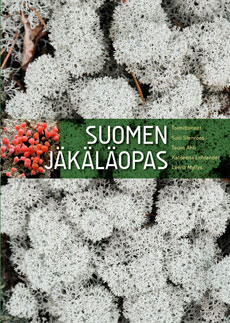 ‘Scientific, aesthetic, timely: the work is all of these. A work of non-fiction can be both precisely factual and emotional, full of both information and soul. A good non-fiction book will surprise. I did not expect to be enthused by lichens, their variety and colours,’ declared Professor Alf Reen in announcing the winner of this year’s Finlandia Prize for Non-Fiction on 17 November.
‘Scientific, aesthetic, timely: the work is all of these. A work of non-fiction can be both precisely factual and emotional, full of both information and soul. A good non-fiction book will surprise. I did not expect to be enthused by lichens, their variety and colours,’ declared Professor Alf Reen in announcing the winner of this year’s Finlandia Prize for Non-Fiction on 17 November.
The winning work is Suomen jäkäläopas (‘Guidebook of lichens in Finland’), edited by Soili Stenroos & Teuvo Ahti & Katileena Lohtander & Leena Myllys (The Botanical Museum / The Finnish Museum of Natural History). The prize is worth €30,000.
The other works on the shortlist of six were the following: Kustaa III ja suuri merisota. Taistelut Suomenlahdella 1788–1790 [(‘Gustav III and the great sea war. Battles in the Gulf of Finland 1788–1790’, John Nurminen Foundation), written by Raoul Johnsson, with an editorial board consisting of Maria Grönroos & Ilkka Karttunen &Tommi Jokivaara & Juhani Kaskeala & Erik Båsk; Unihiekkaa etsimässä. Ratkaisuja vauvan ja taaperon unipulmiin (‘In search of the sandman. Solutions to babies’ and toddlers’ sleep problems’ ) by Anna Keski-Rahkonen & Minna Nalbantoglu (Duodecim); Operaatio Hokki. Päämajan vaiettu kaukopartio (‘Operation Hokki. Headquarters’ silenced long-distance patrol’), an account of a long-distance patrol strike in eastern Karelia during the Continuation War in 1944, by Mikko Porvali (Atena); Trotski (‘Trotsky’, Gummerus; biography) by Christer Pursiainen; and Lintukuvauksen käsikirja (‘Handbook of bird photography’) by Markus Varesvuo & Jari Peltomäki & Bence Máté (Docendo).
Verse and freedom
16 January 2014 | Articles, Non-fiction
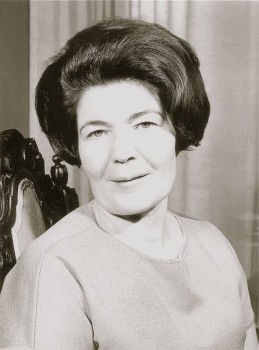
Aale Tynni (1913–1997). Photo: WSOY
Finnish poetic modernism, which with its freedom of rhythm came to dominate the literary mainstream of the 1950s, posed a particular challenge to the poets of the classical metrical and romantic poetic tradition. Aale Tynni (1913–1997) is not a poet of any one school or form, but rhythm is the deepest foundation of her poems, whether expressed in metre, free verse or the speech rhythms that characterise some of her poems of the 1950s and 60s, as well as those of her final years.
An Ingrian Finn, Tynni left Ingermanland near Petersburg for Finland as a refugee after the First World War, in 1919. The war and the period of uncertainty that followed it are present in her poems as an allegory, sometimes appearing as a dance of death or a carnival. At other times they emerge in the myth of Phaethon, who with his sun chariot is in danger of throwing Mother Earth off her axis, or as a game of chess in which God and the angel Gabriel play with the planets and moons as pieces. The poet makes use of mythic and cosmic references to widen her scope and to portray Man in the stages of history and the present age. More…
A slow passion
30 September 2007 | Fiction, Prose
A short story from the collection of short stories Hidas intohimo (‘A slow passion’, Gummerus, 2007)
I don’t want to interfere with it. If something comes of it, then something comes of it. You can’t interfere with time, or fate, or another person. Time ripens things on its own. Fate takes a longer view of things than people do. Like the prophet says, there is a time for every purpose, for my purposes and other people’s.
This garden cottage is a good place to watch everything quietly, a ringside seat for someone who doesn’t want to flail around getting smashed up. The potatoes bloom when it’s time for them to bloom, depending on the length of the summer, the weather, and the time they were planted. Their white and purple flowers are worthy of admiration– potato flowers are flowers, after all. But when the flowers are just opening, it’s not yet time to go digging around among the roots. You have to restrain yourself and wait until the tubers form. You have to wait until they’re finished blooming and the flowers are replaced by plumping green, poisonous berries – though not all potato varieties produce them. But if your fingers are really itching for them, you can poke into the dirt and grope around a little before it’s really time, feel for tubers and remove them carefully, patiently, leaving the plant undisturbed for the smaller ones to grow. If the groping turns up something, you can slip away and savour it, but you still have to wait before you can dig up the whole plant with its rootstock, its beautiful pure tubers heaved up onto the soil, as if Life were offering itself on a silver salver. Then you can have them. They’re ready. But it takes time. Many good things are destroyed by impatience. More…
For the love of a city
31 December 2004 | Archives online, Fiction, Prose
Extracts from the novel I väntan på en jordbävning (‘Waiting for an earthquake’, Söderströms, 2004). Introduction by Petter Lindberg
Nonna Rozenberg lived quite near the special school where I was a boarder, in a block nine stories high with a bas-relief to the right of the door. This bas-relief featured a fairy-tale figure – the Firebird or the Bird Sirin.
I often saw Nonna stepping out of a tram carrying a large brown case. She moved carefully, as if afraid of falling.
She played the cello, and resembled that bulky, melodious instrument herself. Women’s figures are often compared to guitars. But Nonna’s appearance never hinted at parties at home with parents away or singsongs around the camp-fire.
She was no beauty. Her slow, precociously mature body was neither graceful nor girlishly delicate. If I’d met her later, when I was working at a gym, I’d have said she was overweight and lacking in self-discipline. More…
Markus Nummi: Karkkipäivä [Candy day]
26 November 2010 | Mini reviews, Reviews
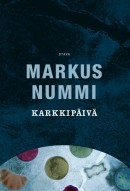 Karkkipäivä
Karkkipäivä
[Candy day]
Helsinki: Otava, 2010. 383 p.
ISBN 978-951-1-24574-2
€28, hardback
Like this one, Markus Nummi’s previous novel, Kiinalainen puutarha (‘Chinese garden’, 2004), set in Asia at the turn of the 20th century, involves a child’s perspective. Karkkipäivä‘s main theme, however, is a portrait of contemporary Finland. Tomi is a little boy whose alcoholic parents are incapable of looking after him; Mirja’s mother is a frantic workaholic heading for a nervous breakdown. She is a control freak who secretly gorges on chocolate at work and beats her little daughter – a grotesque portrait of contemporary womanhood. Tomi manages to get some adult attention and help from a writer; the relation between them gradually builds into one of trust. Katri is a social worker, empathetic but virtually helpless as part of the social services bureaucracy. Virtually every adult suspects others of lying, finding each other’s motives doubtful. Nummi (born 1959) has structured Karkkipäivä with great skill; the ending, in which matters are resolved almost by chance, is particularly gripping. This novel was nominated for the 2010 Finlandia Prize for Fiction.
On the bridge
30 June 1993 | Archives online, Fiction, Prose
From Saksalainen sikakoira (‘Schweinehund’, WSOY, 1992). Introduction by Tuva Korsström
From somewhere beneath the bridge – I still hadn’t managed to get across it, which may sound pathetic, or even ridiculous, unless you take into account my exceptional state of mind – or, rather, to one side, I heard a dragging, ominous grinding and rumbling. It stopped for a moment; then, after a short but clearly defined pause, there was a heavy splash. A snow-plough was emptying its load into the bay from the end of the pier. The mounds of snow sank deep into the black water; the tightly packed, sticky snow rose slowly to the surface in greyish-yellow blocks and clods; loose pieces of snow boiled and foamed in the eddies and melted before my eyes. My time was melting away, too, being junked, my remaining time… More…
Childhood revisited
31 March 2006 | Archives online, Fiction, Prose
Extracts from the novel Tämän maailman tärkeimmät asiat (‘The most important things of this world’, Tammi, 2005). Introduction by Jarmo Papinniemi
I was supposed to meet my mother at a café by the sea. She would be dressed in the same jacket that I had picked out for her five years ago. She would have on a high-crowned hat, but I wasn’t sure about the shoes. She loved shoes and she always had new ones when she came to visit. She liked leather ankle boots. She might be wearing some when she stepped off the train, looking out for puddles. She didn’t wear much make-up. I don’t remember her ever using powder, although I’m sure she did. I could describe her eye make-up more precisely: a little eye shadow, a little mascara, and that’s all.
That’s all? I don’t know my mother. As a child, I lived too much in my own world and it was only after I left home that I was able to look at her from far enough away to learn to know her. She had been so near that I hadn’t noticed her. More…
Summer child
30 September 1988 | Archives online, Fiction, Prose
A short story from Resa med lätt bagage (‘Travelling light’, 1987). Introduction by Marianne Bargum
From the very beginning it was quite clear no one at Backen liked him, a thin gloomy child of eleven; he looked hungry somehow. The boy ought to have inspired a natural protective tenderness, but he didn’t at all. To some extent, it was his way of looking at them, or rather of observing them, a suspicious, penetrating look, anything but childish. And when he had finished looking, he commented in his own precocious way, and my goodness, what that child could wring out of himself.
It would have been easier to ignore if Elis had come from a poor home, but he hadn’t. His clothes and suitcase were sheer luxury, and his father’s car had dropped him off at the ferry. It had all been arranged over the phone. The Fredriksons had taken on a summer child out of the goodness of their hearts, and naturally for some compensation. Axel and Hanna had talked about it for a long time, about how town children needed fresh air and trees and water and healthy food. They had said all the usual things, until they had all been convinced that only one thing was left in order to do the right thing and feel at ease. Despite the fact that all the June work was upon them, many of the summer visitors’ boats were still on the slips, and the overhaul of some not even completed. More…
Briefcase man
31 December 2000 | Archives online, Fiction, Prose
Extracts from the novel Aura (Otava, 2000). Introduction by Mervi Kantokorpi
He was born in the Russian Grand Duchy of Finland the year the world caught fire. He learned to read the year of the revolution, and spoke two languages as his mother tongue border – language and enemy language, as he often used to say. He was proud of only one of his languages; the other, he loved secretly. He spoke one loudly, the other softly, almost in a whisper.
At night, on the telephone, he spoke far away – you could see it, even in the dark, from his expression, his half-closed eyes sometimes breaking into song. It was so beautiful and soft that I wept under the blankets and hated myself because of the effect that language had on me.
Stinking tinker Karelian trickster Russian drinker, little Russky’s dancing in a leather skirt, skirt tears and oh! little Russky’s hurt.
Count to ten, he said. But count in Finnish. Or Swedish, that’ll baffle them. And if they call you a Swedish bastard, it’s not so bad. I’ve taught you the numbers in Arabic and Spanish, too, but I don’t think you’ll be able to remember them yet. More…
In with the new?
17 December 2010 | Letter from the Editors
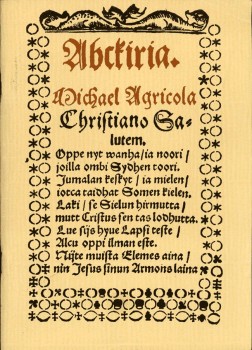
Abckiria (‘ABC book’, 1543): the first Finnish book, a primer by the Reformation bishop Mikael Agricola, pioneer of Finnish language and literature
In August 2010 the American Newsweek magazine declared Finland (out of a hundred countries) the best place to live, taking into account education, health, quality of life, economic dynamism and political environment.
Wow.
In the OECD’s exams in science and reading, known as PISA tests, Finnish schoolchildren scored high in 2006 – and as early as 2000 they had been best at reading, and second at maths in 2003.
Wow.
We Finns had hardly recovered from these highly gratifying pieces of intelligence when, this December, we got the news that in 2009 Finnish kids were just third best in reading and sixth in maths (although 65 countries took part in the study now, whereas in 2000 it had been just 32; the overall winner in 2009 was Shanghai, which was taking part for the first time.)
And what’s perhaps worse, since 2006 the number of weak readers had grown, and the number of excellent ones gone down. More…

